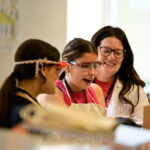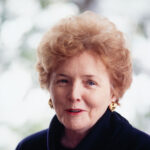
Clayton Offers Reflections on Coronavirus, Climate Change During Interview with Climate One

WOOSTER, Ohio – Susan Clayton, chair of environmental studies and professor of psychology at The College of Wooster, was one of three experts to examine “Invisible Threats: COVID-19 and Climate Change” during an appearance on Climate One, a talk show that engages high-level leaders in conversations about building sustainable economies, resilient communities, and a healthier future, on Tuesday.
The discussion, which did not include a live audience as normal nor guests on stage, kicked off with a thoughtful comparison of the invisible coronavirus versus the invisible gas of carbon pollution. The overall public response has been stronger to the former because “disease is a lot more immediate, a lot more scary than the idea of gradually destroying the atmosphere,” Clayton remarked while also pointing out there is a need for coronavirus to be “interpreted.” She went on to explain “there’s a really big role for social media, for political figures and others to explain (it to people). In one case, we don’t have a lot of people who are very prominent talking about how scary climate change is, but we do have a lot of people talking about how scary COVID-19 is.”
A conservation psychologist and an optimist at heart, Clayton sees a few positives, which can emerge from this global pandemic and carry over to climate change initiatives. “One (thing) that happens during times of a recession is that carbon emissions drop dramatically, so there are probably going to be some immediate benefits there. In the slightly longer term, people will get used to doing things differently. When you have this kind of … transition point, (it) will encourage people to rethink some things that they might not rethink if the economy was just purring along the way it had been. Many people have had to get used to virtual meetings, virtual business meetings, virtual travel. I think a lot of that will stick and it might help a lot of business practices to become more efficient,” she said.
Clayton also has been happy to see how people have come together during this time of need, “community cohesion” she labeled it. There’s been “a lot of emphasis on supporting the local businesses … (and doing) errands for people who might need something. We (have) recognized our dependence on each other, much as we might not want to recognize it … (since) confronted by it.”
Another potential development is an increase in respect for authority, according to Clayton. Throughout this crisis, a number of elected officials and public health experts have demonstrated “that leaders can … make a difference.” Though “we’re a very individualistic country and we don’t like to be told what to do,” she explained “this is a case where many people are recognizing that you need to have government help, government advice, government regulations to really get through this.”
Blame was another topic for the panelists, with Clayton saying it’s very important to “move beyond (blame) because it does have implications for actions.” She alluded to the condemnation of another country for the coronavirus rather than “thinking of policies that our country could implement that could protect us or take better care of us,” and it could be argued a similar thought process has slowed down the enactment of significant environmental policy changes.
The 83-minute program, which can be viewed on YouTube and included many other topics, ended on a playful note. The psychologist in Clayton came out, as she offered advice for individuals on how to cope with anxiety under these current circumstances, underscoring “to keep those social connections going” as well as admitting that it’s okay to settle in for a few episodes of your favorite television show. “There are some anxieties that need to be faced, and that avoiding just postpones them. Since there’s not that much we can do about this right now, there’s nothing wrong with just taking your mind off of it for a few hours and just binging something.”
Climate One, based out of San Francisco and founded in 2007, is the only regular talk show dedicated to bringing together top thinkers and doers from business, government, academia, and advocacy groups for leadership dialogue on energy, the economy, and the environment in an effort to advance the discussion about a clear energy future.
Posted in Faculty, News on March 26, 2020.
Related Posts
Related Areas of Study
Psychology
Do research, work with faculty mentors, and tailor a psychology program to your interests
Major MinorEnvironmental Studies
Natural sciences, social sciences, and humanities courses combine for those who want to be part of environmental solutions
Major Minor

